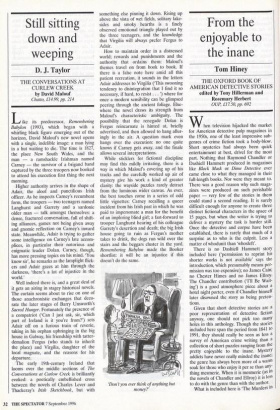Still sitting down and weeping
D. J. Taylor
THE CONVERSATIONS AT CURLEW CREEK by David Malouf Chatto, £14.99, pp. 214
Like its predecessor, Remembering Babylon (1993), which began with a whirling black figure emerging out of the horizon, David Maloufs new novel opens with a single, indelible image: a man lying in a but waiting to die. The time is 1827, the place New South Wales, and the man — a ramshackle Irishman named Carney — the survivor of a brigand band captured by the three troopers now booked to attend his execution first thing the next morning.
Higher authority arrives in the shape of Adair, the aloof and punctilious Irish officer. As he inspects Carney's recumbent form, the troopers — two teenagers named Langhurst and Garrety and a sardonic older man — talk amongst themselves: a dense, fractured conversation, full of shift- ing alliances, games not being given away and gnomic reflection on Carney's inward state. Meanwhile, Adair is trying to gather some intelligence on Canvey's late accom- plices, in particular their notorious and enigmatic leader Dolan. Carney, though, has more pressing topics on his mind. You know sir', he remarks as the lamplight flick- ers and Adair gazes at him through the darkness, 'there's a lot of injustice in the world.'
Well indeed there is, and a great deal of it gets an airing in stagey historical novels. The curtain seems about to rise on one of those anachronistic exchanges that deco- rate the later stages of Barry Unsworth's Sacred Hunger. Fortunately the presence of a compatriot ('Can I just ask, sir, which part of Ireland is it you're from?') sets Adair off on a furious train of reverie, taking in his orphan upbringing in the big house in Galway, his friendship with tatter- demalion Fergus (who stands to inherit the place) and Virgilia, daughter of the local magnate, and the reasons for his departure.
The early 19th-century Ireland that looms over the middle sections of The Conversations at Curlow Creek is brilliantly evoked: a poetically embellished cross between the novels of Charles Lever and Thackeray's Irish Sketchbook, but with something else pinning it down. Rising up above the vista of wet fields, solitary lake- sides and smoky hearths is a finely observed emotional triangle played out by the three teenagers, and the knowledge that Virgilia will always prefer Fergus to Adair.
How to maintain order in a distressed world; rewards and punishments and the authority that ordains them: Malours themes travel on from book to book. If there is a false note here amid all this patient recreation, it sounds in the letters Adair addresses to Virgilia (`This swooning tendency to disintegration that I find it so necessary, if hard, to resist ... ') where for once a modern sensibility can be glimpsed peering through the ancient foliage. Else- where the novel draws its strength from Malours characteristic ambiguity. The possibility that the renegade Dolan is Fergus reincarnate is hinted at, briefly advertised, and then allowed to hang allur- ingly in the air. A question mark even hangs over the execution: no one quite knows if Carney gets away, and the finale allows several interpretations.
While sticklers for fictional discipline may find this mildly irritating, there is a way in which Malours covering up of his tracks and the carefully worked up air of mystery give his work a kind of greater clarity: the wayside puzzles rarely detract from the luminous wider canvas. As ever, the best touches come in a series of odd little vignettes: Carney recalling a queer incident from his Irish past in which he was paid to impersonate a man for the benefit of an imploring blind girl; a fast-forward to trooper Langhurst hearing of his colleague Garrety's desertion and death; the big Irish house going to ruin as Fergus's mother takes to drink, the dogs run wild over the stairs and the beggars cluster in the yard. Remembering Babylon made the Booker shortlist: it will be an injustice if this doesn't do the same.
'Don't you ever think of anything but money?'


























































 Previous page
Previous page